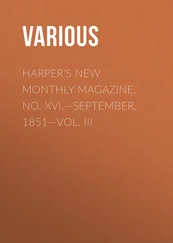Various - Harper's New Monthly Magazine, No. XXIV, May 1852, Vol. IV
Здесь есть возможность читать онлайн «Various - Harper's New Monthly Magazine, No. XXIV, May 1852, Vol. IV» — ознакомительный отрывок электронной книги совершенно бесплатно, а после прочтения отрывка купить полную версию. В некоторых случаях можно слушать аудио, скачать через торрент в формате fb2 и присутствует краткое содержание. Издательство: Иностранный паблик, Жанр: periodic, foreign_edu, на английском языке. Описание произведения, (предисловие) а так же отзывы посетителей доступны на портале библиотеки ЛибКат.
- Название:Harper's New Monthly Magazine, No. XXIV, May 1852, Vol. IV
- Автор:
- Издательство:Иностранный паблик
- Жанр:
- Год:неизвестен
- ISBN:нет данных
- Рейтинг книги:4 / 5. Голосов: 1
-
Избранное:Добавить в избранное
- Отзывы:
-
Ваша оценка:
- 80
- 1
- 2
- 3
- 4
- 5
Harper's New Monthly Magazine, No. XXIV, May 1852, Vol. IV: краткое содержание, описание и аннотация
Предлагаем к чтению аннотацию, описание, краткое содержание или предисловие (зависит от того, что написал сам автор книги «Harper's New Monthly Magazine, No. XXIV, May 1852, Vol. IV»). Если вы не нашли необходимую информацию о книге — напишите в комментариях, мы постараемся отыскать её.
Harper's New Monthly Magazine, No. XXIV, May 1852, Vol. IV — читать онлайн ознакомительный отрывок
Ниже представлен текст книги, разбитый по страницам. Система сохранения места последней прочитанной страницы, позволяет с удобством читать онлайн бесплатно книгу «Harper's New Monthly Magazine, No. XXIV, May 1852, Vol. IV», без необходимости каждый раз заново искать на чём Вы остановились. Поставьте закладку, и сможете в любой момент перейти на страницу, на которой закончили чтение.
Интервал:
Закладка:
Various
Harper's New Monthly Magazine, No. XXIV, May 1852, Vol. IV
RODOLPHUS. – A FRANCONIA STORY
I. ANTONIO
The person who came in so suddenly to help the boys extinguish the fire under the corn-barn, on the night of the robbery, was Antonio, or Beechnut, as the boys more commonly called him. In order to explain how he came to be there, we must go back a little in our narrative, and change the scene of it to Mrs. Henry's house at Franconia, where Antonio lived.
One morning about a week before the robbery, Phonny, Mrs. Henry's son, and his cousin Malleville, who was at that time making a visit at his mother's, were out upon the back platform at play, when they saw Antonio walking toward the barn.
"Children," said Antonio, "we are going into the field to get a great stone out of the ground. You may go with us if you like."
"Well;" said Phonny, "come, Malleville, let us go."
So the children followed Antonio to the barn. There was a man there, one of Mrs. Henry's workmen, called James, who was getting out the oxen. James drove the oxen into the shed, and there attached them to a certain vehicle called a drag. This drag was formed of two planks placed side by side, with small pieces nailed along the sides and at the ends. The drag was shaped at the front so as to turn up a little, in order that it might not catch in the ground when drawn along. There was a hole in the front part of the drag for the end of a chain to be passed through, to draw the drag by. The end of the chain was fastened by a wooden pin called a fid , which was passed through the hook or one of the links, and this prevented the chain from being drawn back through the hole again.
While James was attaching the oxen to the drag, Antonio was putting such tools and implements upon it as would be required for the work. He put on an iron bar, an ax, a saw, a shovel, and two spare chains.
"Now, children," said he, "jump on."
So Phonny and Malleville jumped on, and Antonio with them. Antonio stood in the middle of the drag, while Phonny and Malleville took their places on each side of him, and held on by his arms. James then started the oxen along, and thus they went into the field.
"And now, Beechnut," said Malleville, "I wish you would sing me the little song that Agnes sung when she was dancing on the ice that summer night."
Phonny laughed aloud at this. "Oh, Malleville!" said he; "there could not be any ice on a summer night."
"Yes, there could," said Malleville, in a very positive tone, "and there was. Beechnut told me so."
"Oh, that was only one of Beechnut's stories," said Phonny, "made up to amuse you."
"Well, I don't care," said Malleville, "I want to hear the song again."
Beechnut had told Malleville a story about the fairy Agnes whom he found dancing upon a fountain one summer night in the woods, having previously frozen over the surface of the water with a little silver wand. He had often sung this song to Malleville, and now she wished to hear it again. The words of the song, as Beechnut sang them, were as follows:
Peep! peep! chippeda dee.
Playing in the moonlight, nobody to see.
The boys and girls have gone away,
They've had their playtime in the day
And now the night is left for me:
Peep! peep! chippeda dee.
When Beechnut had sung the song Malleville said, "Again." She was accustomed to say "again," when she wished to hear Beechnut go on with his singing, and as she usually liked to hear such songs a great many times. Beechnut always continued to sing them, over and over, as long as she said "again."
Thus Malleville kept him singing Agnes's song in this instance all the way toward the field.
At length Malleville ceased to say "again," on account of her attention being attracted to a bridge which she saw before them, and which it was obvious they were going to cross. It had only logs on the sides of it for railing. Beyond the bridge the road lay along the margin of a wood. The stone which James and Antonio were going to get out, was just beyond the bridge, and almost in the road. When the oxen got opposite to the stone, James stopped them, and Antonio and the children got off the drag.
It was only a small part of the stone that appeared above the ground. James took the shovel and began to dig around the place, so as to bring the stone more fully to view, while Antonio went into the wood to cut a small tree, in order to make a lever of the stem of it. Phonny took the saw – first asking Antonio's permission to take it – and climbed up into a large tree near the margin of the wood, where he began to saw off a dead branch which was growing there, and which may be seen in the picture. Malleville, in the mean time, sat down upon a square stone which was lying by the road-side near the wood, and occupied herself sometimes in watching the operation of digging out the stone, sometimes in looking up at Phonny, and sometimes in singing the song which Antonio had sung to her on the way.
Presently Antonio, having obtained his lever, came out into the road with it, and laid it down by the drag. He looked at the drag in doing this, and observed that one of the side-pieces had started up, and that it ought to be nailed down again. He looked up into the tree where Phonny was sawing, and said:
"Phonny!"
"What!" said Phonny.
"Look up over your head," said Antonio. Phonny looked up.
"Do you see that short branch just above you?"
"This?" said Phonny, putting his hand upon it.
"Yes," said Antonio.
"Yes," said Phonny, "I see it."
"Hang your saw on it," said Antonio.
Phonny did so.
"Now, come down from the tree," said Antonio.
Phonny climbed down as fast as he could, and came to Beechnut.
"Take all the things out of your pocket and put them down on the drag."
Phonny began to take the things out. First came a pocket handkerchief. Then a knife handle without any blades. Then a fishing line. Then two old coins and a dark red pebble stone. This exhausted one pocket. – From the other came a small glass prism, three acorns, and at last two long nails.
"Ah, that is what I want," said Antonio, taking up the nails. "I thought you had two nails in your pocket, for I remembered that I gave you two yesterday. Will you give them back to me again?"
"Yes," said Phonny.
"Now, put the things back in your pocket. I admire a boy that obeys orders, without stopping to ask why. He waits till the end, and then he sees why. Now, you can go back to your saw."
But instead of going back to his saw, Phonny seemed just at that instant to get a glimpse of something which attracted his attention along the road beyond the bridge, for as soon as he had put his goods and chattels back in his pockets, he paused a moment, looking in that direction, and then he set out to run as fast as he could over the bridge. Antonio looked, and saw that there was a girl coming along, and that Phonny was running to meet her.
Antonio wondered who it could be.
It proved to be Ellen Linn. When Malleville saw that it was Ellen, she ran to meet her. She asked her why she did not bring Annie with her.
"I did," said Ellen; "she is at the house. She was tired after walking so far, and so I left her there."
"I am glad that she has come," said Malleville, "let us go and see her."
"Not just yet," said Ellen. "I will go with you pretty soon."
The fact was that Ellen had come to see Antonio about Rodolphus, and now she did not know exactly how she should manage to have any conversation with him alone; and she did not wish to talk before James and all the rest about the misconduct of her brother. As soon as Antonio saw her, he went to meet her, and walked with her up to the place where they were at work, to show her the great stone that they were digging out. Ellen looked at it a few minutes and asked some questions about it, but her thoughts were after all upon her brother, and not upon the stone. Presently she went to the place where Malleville had been sitting, and sat down there. She thought, perhaps, that Antonio would come there, and that then she could speak to him.
Читать дальшеИнтервал:
Закладка:
Похожие книги на «Harper's New Monthly Magazine, No. XXIV, May 1852, Vol. IV»
Представляем Вашему вниманию похожие книги на «Harper's New Monthly Magazine, No. XXIV, May 1852, Vol. IV» списком для выбора. Мы отобрали схожую по названию и смыслу литературу в надежде предоставить читателям больше вариантов отыскать новые, интересные, ещё непрочитанные произведения.
Обсуждение, отзывы о книге «Harper's New Monthly Magazine, No. XXIV, May 1852, Vol. IV» и просто собственные мнения читателей. Оставьте ваши комментарии, напишите, что Вы думаете о произведении, его смысле или главных героях. Укажите что конкретно понравилось, а что нет, и почему Вы так считаете.












